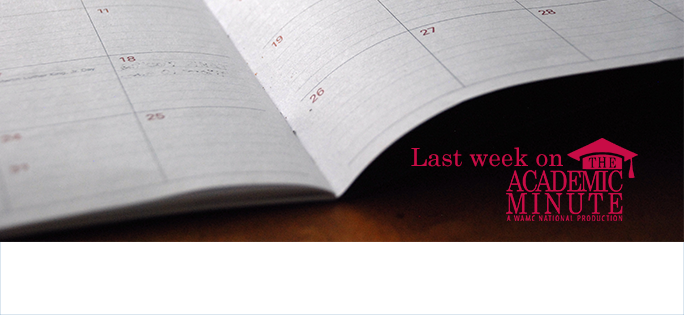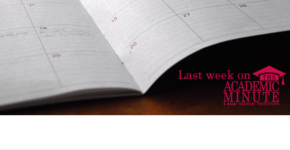
Academic Minute from 8.7 – 8.11
Monday, August 7th
Joseph Chakkalakal – University of Rochester
Stem Cells and Muscle Decay
Dr. Joe Chakkalakal is an Assistant Professor in the Department of Orthopaedics, Center for Musculoskeletal Research at the University of Rochester Medical Center. His laboratory is interested in the contribution of stem cells to the maturation, regeneration, and lifelong maintenance of skeletal muscle.
Through the use of conditional genetic strategies Dr. Chakkalakal’s lab has uncovered niche derived signals responsible for age-related decline of skeletal muscle resident stem cells. More recently, the Chakkalakal lab has found resident stem cell loss or gain is associated with earlier onset or attenuation of age-related skeletal muscle decline respectively. Dr. Chakkalakal’s lab is interested in building on these observations to 1) uncover how resident stem cell manipulation affects specific aspects of skeletal muscle biology in models of post-natal maturation, aging or accelerated aging, and 2) identify therapies that promote resident stem cell maintenance and function.
Tuesday, August 8th
Gary LaFree – University of Maryland
Preventing Terrorist Attacks
Gary LaFree is Professor of Criminology and Criminal Justice and Director of the National Consortium for the Study of Terrorism and Responses to Terrorism (START) at the University of Maryland. He received his Ph.D. in Sociology from Indiana University in 1979. During 2005-2006, Dr. LaFree served as President of the American Society of Criminology (ASC). Dr. LaFree was named a Fellow of the American Society of Criminology in 2006 and a member of the National Academy of Science’s Committee on Law and Justice in 2008. He has also served as the Past President of the ASC’s Division on International Criminology (1991-1993), the chair of the American Sociological Association’s Section on Crime, Law and Deviance (1991-1993), the Executive Board of the Harry Frank Guggenheim Foundation (2001-2006), and the Executive Committee of the Justice Research Statistics Association (2000-2001, 1993-1994)..
Wednesday, August 9th
Christian Kiewitz – University of Dayton
Bad Bosses and Defensive Silence
Christian Kiewitz is a professor of management at the University of Dayton. His publications and research interests involve workplace aggression, especially abusive supervision, as well as organizational politics and justice, and the impact of personality, affect and stress on work-related issues. He received his PhD in organizational behavior from The University of Alabama after completing undergraduate and graduate studies in mass communication, psychology and sociology at the Johannes Gutenberg-Universität in Mainz, Germany, and Auburn University, Alabama.
Thursday, August 10th
Bruce Y. Lee – Johns Hopkins University
Physical Inactivity is Everyone’s Problem
Bruce Y. Lee, MD, MBA is Associate Professor of International Health at the Johns Hopkins Bloomberg School of Public Health, Executive Director of the Global Obesity Prevention Center (GOPC) at Johns Hopkins (www.globalobesity.org), and Director of Operations Research at the International Vaccine Access Center (IVAC) as well as Associate Professor at the Johns Hopkins Carey Business School. Dr. Lee has over 15 years of experience in industry and academia in systems science and developing and implementing mathematical and computational methods, models, and tools to assist decision making in public health and medicine. He has been the Principal Investigator for projects supported by a variety of organizations and agencies including the Bill and Melinda Gates Foundation, the National Institutes of Health (NIH), the Agency for Healthcare Quality and Research (AHRQ), the Centers for Disease Control and Prevention (CDC), UNICEF, the Global Fund, and USAID.
Friday, August 11th
Trina Rytwinski – Carleton University
Evidence Based Management
My research focuses on understanding the circumstances in which roads and traffic affect wildlife populations. I am particularly interested in looking at species traits and their behavioral responses to roads, to determine which species or species groups are most vulnerable to road impacts, and determining ways to mitigate road effects. My current research focuses on two aspects: (1) determining ways to improve knowledge on the influence of mitigation measures on wildlife populations through experiments, and (2) assessing the use and effectiveness of mitigation measures intended to decrease road related impacts on wildlife.
